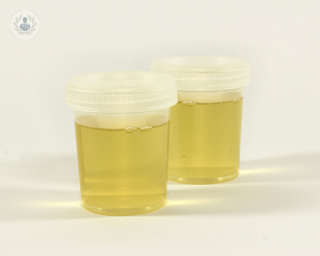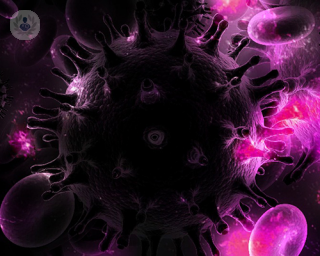What is proteinuria?
Proteinuria is a condition that occurs when there is protein in the urine. A high amount is considered over 150 mg.

This condition should be borne in mind when diagnosing haematuria (blood in the urine) as if they are affecting an individual at the same time, it may be due to kidney disease.
What are the symptoms?
In the early stages of the disease, symptoms may not be noticed. As the condition progresses, the following symptoms may be present:
- Cloudy urine or blood in the urine
- Pain or burning when urinating
- Swelling of the hands, feet, abdomen, or face
- Tiredness, malaise, and nausea
- Breathing difficulties
- Loss of appetite
What causes it?
The kidneys are responsible for filtering waste from the blood, while retaining what the body needs, including proteins. With proteinuria, there is a problem with how the kidneys are able to filter.
There are some conditions that cause higher levels of protein in the urine and do not necessarily indicate kidney damage. They include:
- Dehydration
- Emotional stress
- Exposure to extreme cold
- Fever
- Strenuous exercise.
A variety of other conditions can cause a permanent higher level of protein in the urine, such as:
- Diabetes
- Amyloidosis: abnormal protein accumulation in organs
- Lupus: autoimmune disease
- Drug poisoning
- Chronic kidney disease.
How can it be prevented?
A lot of people have protein in their urine so it is important to be aware of the risks it may entail. Some useful tips to avoid issues with excess protein in the urine are:
- Have regular blood and urine tests if you have any symptoms or are at risk of proteinuria.
- Drink water frequently
- Have a balanced diet with a lot of fibre
- Manage hypertension or diabetes adequately.
What is the treatment?
Treatment involves replacing the protein value and finding out the cause for its loss, it may include:
- The main treatment involves monitoring blood pressure and blood sugar levels. Lifestyle changes may need to be made including taking medications
- If there is a build-up of fluid in the ankles or lung area, there are some diuretic medicines that can be taken to help get rid of the excess fluid
- If the kidney damage is severe, kidney dialysis or a transplant may be an option.
Proteinuria (protein in the urine)
Professor Liz Lightstone - Nephrology
Created on: 01-09-2013
Updated on: 05-22-2023
Edited by: Conor Lynch
What is proteinuria?
Proteinuria is a condition that occurs when there is protein in the urine. A high amount is considered over 150 mg.

This condition should be borne in mind when diagnosing haematuria (blood in the urine) as if they are affecting an individual at the same time, it may be due to kidney disease.
What are the symptoms?
In the early stages of the disease, symptoms may not be noticed. As the condition progresses, the following symptoms may be present:
- Cloudy urine or blood in the urine
- Pain or burning when urinating
- Swelling of the hands, feet, abdomen, or face
- Tiredness, malaise, and nausea
- Breathing difficulties
- Loss of appetite
What causes it?
The kidneys are responsible for filtering waste from the blood, while retaining what the body needs, including proteins. With proteinuria, there is a problem with how the kidneys are able to filter.
There are some conditions that cause higher levels of protein in the urine and do not necessarily indicate kidney damage. They include:
- Dehydration
- Emotional stress
- Exposure to extreme cold
- Fever
- Strenuous exercise.
A variety of other conditions can cause a permanent higher level of protein in the urine, such as:
- Diabetes
- Amyloidosis: abnormal protein accumulation in organs
- Lupus: autoimmune disease
- Drug poisoning
- Chronic kidney disease.
How can it be prevented?
A lot of people have protein in their urine so it is important to be aware of the risks it may entail. Some useful tips to avoid issues with excess protein in the urine are:
- Have regular blood and urine tests if you have any symptoms or are at risk of proteinuria.
- Drink water frequently
- Have a balanced diet with a lot of fibre
- Manage hypertension or diabetes adequately.
What is the treatment?
Treatment involves replacing the protein value and finding out the cause for its loss, it may include:
- The main treatment involves monitoring blood pressure and blood sugar levels. Lifestyle changes may need to be made including taking medications
- If there is a build-up of fluid in the ankles or lung area, there are some diuretic medicines that can be taken to help get rid of the excess fluid
- If the kidney damage is severe, kidney dialysis or a transplant may be an option.


Should I be worried if I have protein in my urine?
By Professor Jeremy Levy
2024-11-21
Here, Professor Jeremy Levy, a highly experienced and skilled London-based consultant nephrologist, provides us with an all-you-need-to-know guide on what protein in the urine normally indicates, and whether patients should be worried or not if protein is found in their urine. See more


Protein in urine: what does this indicate?
By Professor Liz Lightstone
2024-11-21
Proteinuria is a symptom of an underlying health problem in which there are increased levels of protein in the urine. If it is left undetected or untreated, proteinuria can progress to more serious complications. We spoke to Professor Liz Lightstone, one of our top consultant nephrologists operating in London, about this symptom to understand what it means to have it and what underlying health conditions might be causing it. See more


CKD: Causes, symptoms and management of even the most severe cases - and more
By Dr James Pattison
2024-11-17
It's reassuring to learn about recent medical advances that allow for effective management of chronic kidney disease (CKD), even the more severe cases. Here to explain more and discuss other issues surrounding this common condition, particularly in the older population, is leading consultant nephrologist Dr James Pattinson. See more


HIV and the kidney
By Professor Jeremy Levy
2024-11-16
Did you know that HIV can cause kidney damage? Top nephrologist Professor Jeremy Levy talks us through the kidney problems HIV can cause. See more
Experts in Proteinuria (protein in the urine)
-
Professor Liz Lightstone
NephrologyExpert in:
- Pregnancy and kidney disease
- Glomerulonephritis
- Proteinuria (protein in the urine)
- Lupus
- Nephropathy (Kidney disease)
- Diabetic nephropathy
-
Professor Jeremy Levy
NephrologyExpert in:
- Chronic kidney disease
- Diabetic nephropathy
- Glomerulonephritis
- Polycystic kidney disease (PKD)
- Proteinuria (protein in the urine)
- Urinary tract infection
-
Dr James Pattison
NephrologyExpert in:
- Proteinuria (protein in the urine)
- Chronic kidney disease
- Urinary tract infection
- Kidney transplantation
- Diabetic nephropathy
- Haematuria (blood in the urine)
-
Dr Bernhard Klebe
NephrologyExpert in:
- Hypertension (high blood pressure)
- Chronic kidney disease
- Haematuria (blood in the urine)
- Kidney stones
- Proteinuria (protein in the urine)
- Acute kidney injury (AKI)
-
Dr Daniel Jones
NephrologyExpert in:
- Proteinuria (protein in the urine)
- Haematuria (blood in the urine)
- Chronic kidney disease
- Polycystic kidney disease (PKD)
- Diabetic nephropathy
- Acute kidney injury (AKI)
- See all

Westminster Bridge Consulting Rooms at St Thomas' Hospital Private Healthcare.
Westminster Bridge Consulting Rooms at St Thomas' Hospital Private Healthcare.
Westminster Bridge Road, London
No existe teléfono en el centro.
By using the telephone number provided by TOP DOCTORS, you automatically agree to let us use your phone number for statistical and commercial purposes. For further information, read our Privacy Policy
Top Doctors

London Bridge Hospital - part of HCA Healthcare
London Bridge Hospital - part of HCA Healthcare
27 Tooley St
No existe teléfono en el centro.
By using the telephone number provided by TOP DOCTORS, you automatically agree to let us use your phone number for statistical and commercial purposes. For further information, read our Privacy Policy
Top Doctors

Guy’s and St Thomas’ Private Healthcare
Guy’s and St Thomas’ Private Healthcare
Guy’s Hospital, Great Maze Pond
No existe teléfono en el centro.
By using the telephone number provided by TOP DOCTORS, you automatically agree to let us use your phone number for statistical and commercial purposes. For further information, read our Privacy Policy
Top Doctors
-
Westminster Bridge Consulting Rooms at St Thomas' Hospital Private Healthcare.
Westminster Bridge Road, London , SE1 South Bank LondonExpert in:
- General Surgery
- Orthopaedic surgery
- Plastic surgery, reconstructive and aesthetics
- Endocrinology
- Obstetrics and Gynaecology
- Paediatrics
-
London Bridge Hospital - part of HCA Healthcare
27 Tooley St, Central LondonExpert in:
- 24-hour service
- Cardiology
- Minimal access surgery (keyhole surgery)
- Orthopaedic surgery
- Cardiovascular disease
- Gastroenterology
-
Guy’s and St Thomas’ Private Healthcare
Guy’s Hospital, Great Maze Pond, SE1 South Bank LondonExpert in:
- Allergy
- Cardiology
- General Surgery
- Maxillofacial Surgery
- Thoracic Surgery
- Maternity care
- Most viewed diseases, medical tests, and treatments
- Kidney stones
- Metabolic disorder
- Robotic surgery
- Hypertension (high blood pressure)
- Diabetes
- Atherosclerotic renal disease
- Pregnancy and kidney disease
- Kidney cancer
- Diabetic nephropathy
- Dialysis







